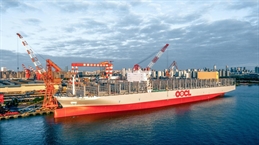
"OOCL reaffirms its unwavering commitment to the United States market," OOCL said. "Since the implementation of the USTR 301 port fee on October 14, 2025, OOCL has maintained its full range of services and operational capacity. At no time has OOCL withdrawn from the market or compromised the quality of its offerings."
OOCL added that throughout this period, the ocean carrier has remained fully compliant with all applicable policies, ensuring the timely payment of the port fee and thereby preventing any disruption to our services.
Looking ahead, OOCL said it will continue to serve its customers with the highest standards of excellence and reliability, further strengthening its leadership position in the United States market.
In April 2025, the USTR imposed the new port fees on Chinese-built and -operated merchant ships calling at American ports. These fees—approximately US$50 per net ton—were part of a broader strategy under Section 301 of the Trade Act of 1974 to counter China's dominance in global shipbuilding and maritime logistics.
The action stemmed from a federal investigation that concluded China had leveraged unfair trade practices to gain a dominant position in the global shipping sector. In retaliation, China introduced its own port fees targeting U.S.-registered ships and companies with substantial U.S. investment.
On October 30, during trade talks in Busan, South Korea, U.S. President Donald Trump and Chinese President Xi Jinping agreed to a one-year suspension of these reciprocal port fees. The suspension took effect on November 10, 2025, and applies to all vessels with U.S. or Chinese nexus.



